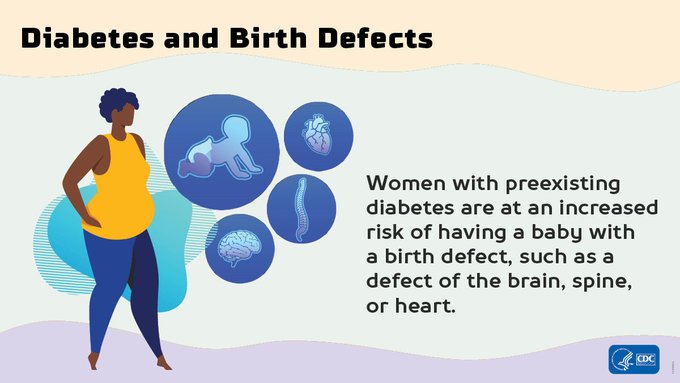RT
: Pre-existing #diabetes can cause problems during #pregnancy for women and their developing babies. Managing blood sugar levels can help lower the chance for birth defects. Learn more: bit.ly/2OmbQFj.

Pre-existing Diabetes Can Increase Risk for Birth Defects

A study from the Centers for Disease Control and Prevention (CDC) found that women with pre-existing diabetes are at an increased risk of having a baby with a birth defect, such as a defect of the brain, spine, or heart. Women with pre-existing diabetes can increase their chances of having a healthy baby by planning for pregnancy and working with a doctor to manage their blood sugar before and during pregnancy.
Read the full scientific article.
Main Findings
- Pre-existing diabetes substantially increased the risk for many types of major birth defects.
- Researchers saw the strongest associations between pre-existing diabetes and sacral agenesis (a birth defect of the lower spine), holoprosencephaly (a birth defect of the brain), and limb defects.
- Several types of congenital heart defects were also strongly linked to maternal pre-existing diabetes. These include truncus arteriosus and atrioventricular septal defect.
- Women with pre-existing diabetes can increase their chances of having a healthy baby by adopting healthy behaviors before and during pregnancy, including
- Seeing a healthcare professional regularly;
- Keeping blood sugar levels under control, with the help of a doctor and dietician, before and during pregnancy;
- Getting 400 micrograms (mcg) of folic acid every day before and during pregnancy; and
- Striving to reach and maintain a healthy weight before pregnancy.
What Does This Mean For You?
Women with pre-existing diabetes can increase their chances of having a healthy baby by planning for pregnancy and working with a doctor to manage their blood sugar before and during pregnancy.
About This Study
- Although this study found a significant risk for birth defects, it’s important to remember that birth defects are rare conditions that can be caused by a variety of genetic and environmental factors.
- Researchers used data from the National Birth Defects Prevention Study, which collected information on babies born with and without birth defects in order to study what might cause or prevent birth defects.
About Birth Defects
Birth defects are structural changes present at birth that can affect almost any part of the body, such as the heart, brain, or foot. Birth defects are common, costly, and critical conditions that affect 1 in 33 babies born in the United States.
Our Work
CDC’s National Center on Birth Defects and Developmental Disabilities (NCBDDD) strives to save babies through birth defects prevention and research. NCBDDD uses birth defects tracking and research to identify causes of birth defects, find opportunities to prevent them, and improve the health of those living with birth defects. Learn how NCBDDD makes a difference.
More Information
Scientific Reference
Tinker SC, Gilboa SM, Moore CA, Waller DK, Simeone RM, Kim SY, Jamieson DJ, Botto LD, Reefhuis J, and the National Birth Defects Prevention Study. Specific birth defects in pregnancies of women with diabetes – National Birth Defects Prevention Study, 1997–2011. Am J Obstet Gynecol. 2019 Aug 24. [Epub ahead of print]


































No hay comentarios:
Publicar un comentario